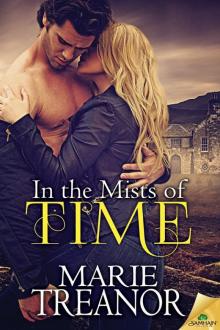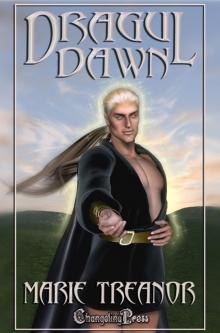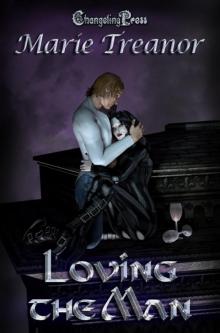- Home
- Marie Treanor
The Prisoner of Silverwood Castle Page 19
The Prisoner of Silverwood Castle Read online
Page 19
I pressed my hand over my heart, slowly calming it as I lay down with his most recent notebook under my cheek and pulled the bedclothes back over me.
“Kasimir,” I whispered to the candle. “I love you.”
* * * * *
In the morning, I dragged Barbara with me through the old section of the castle to Kasimir’s erstwhile prison. She admired the wonderful medieval hall as I did.
“This area was always neglected,” I told her. “Filthy with decades, even centuries of dirt. I don’t know when it was last used, but you can see some seriously thick cobwebs. And the dust crunches under your feet, all the way along here and up the steps to the first landing. So anyone stumbling by accident on this part of the castle would assume it was disused as everyone told me.”
I led her quickly up the stairs, aware that she came more slowly, gazing around her.
“But here,” I said triumphantly, leading her into the familiar room with the old table, “is clean. Or it was. Dieter swept it every day. It’s still a lot cleaner than the rest of the tower. That’s what convinced me Kasimir was no ghost. Who cleans for a ghost?”
“You’d be surprised, but I take your point.” Barbara stood in the middle of the cramped floor, unexpectedly tense as she gazed about her.
I said, “The cell where he—Kasimir—slept is up here.” I set my foot on the first step, but Barbara didn’t follow. “What is it?” I asked uneasily. “Are there spirits here?”
She nodded. “Old ones. And pockets of pain and suffering.” Her gaze flickered to me, and beyond to the narrow staircase. “It’s worse up there.”
“Don’t you want to go up?” I asked, disappointed but resigned. She felt more than I.
Her breath caught. “I don’t want you to go up there.”
I frowned, though I didn’t take my foot off the step. “Why not?”
“I don’t know.” She shook her head. “There is something there.”
“What?” I asked eagerly.
“I don’t know.”
I took my foot off the step, moving towards her. “It frightens you,” I observed, awed.
“Yes,” she agreed. “Yes it does.”
“You said spirits couldn’t hurt us.”
“Spirits can’t.” She dragged her gaze from the stairs to me. “I don’t know what this is.”
“Shouldn’t we find out?” I asked reasonably.
“No,” she said. She swallowed visibly. “You shouldn’t. I should.” Straightening her shoulders, she marched past me and began to climb the stairs.
Perversely, it was now I who caught at her arm. “Wait, Barbara,” I said urgently. “What if it’s the beast? I thought I heard it in my sleep last night.”
“There are no signs of beasts,” she said dryly. “But yes, stand by the nearest door and be prepared to slam it after us if we need to run.”
“There are no doors down here!”
“Improvise,” Barbara said unhelpfully. She was still climbing the stairs. I hurried after her. “Guin, go away.”
“I got you into this. We can run together.”
She said no more, simply climbed on to Kasimir’s empty cell.
I blurted, “Someone took the bed away. It must have been Dieter, the gaoler. Dieter must still be alive.”
“Isn’t that good?” Barbara enquired.
“If you wanted to be very kind, you could bring me a file instead. One of those sharp, narrow ones I could use to kill my gaoler after I cut my chains with it.”
“I don’t know. Where is he?”
“Not here,” Barbara said, gazing around the empty room. “You said he was a deaf mute. Maybe he still makes some kind of noise, though. Maybe he’s your beast and has nowhere else to go but here. Maybe he’s still living here.”
I looked over my shoulder. “He’s not a nice man.”
“Never mind. I have my handy letter opener in my pocket.”
“I’ve got my scissors,” I confessed, curling my fingers around the handles for comfort.
“That’s what I like about you, Guin. Always prepared.” She spoke absently, distractedly, her main focus clearly on whatever she saw or felt in the room.
“What do you see?” I asked.
“Nothing. Not even shapes in the shadows.”
“But you feel something.”
“Pain. Fury. Hate. So intense, so aggressive…” Her eyes widened. “So familiar. Why? Why is that?” She turned, spreading her arms wide as if inviting it, whatever it was, closer.
I shivered in the suddenly chilly air, staring at her in awe and not a little fear.
Her breath caught. “Kasimir.”
Abruptly, she dropped her arms and grabbed my hand, dragging me from the room. Without meaning to, I strained against her, unable to move. I felt it again, that invisible hand on my collar, my skirts, keeping me here. Terror swept over me.
“Guin, don’t fight me!” Barbara exclaimed. “It isn’t safe here. Run!”
“I’m not,” I whispered, struggling. “Pull me.”
She swung around, tugging, glaring beyond my head while I forced my feet forward against the strain. It seemed so much stronger and harder to resist than the last time. And then, abruptly, I almost fell out of the doorway. Barbara, still holding my hand, fled with me.
I’d have gone further, but at the foot of the narrow stairs, she paused and turned back.
“What?” I asked with dread. “Is it following? Did you not scare it off?”
“I think I forced it to release you, but it isn’t remotely scared. It just isn’t following.”
“Well, that’s a relief!”
She nodded, looking unconvinced. “Why? Why isn’t it following? It seemed to want you an awful lot.”
“Maybe it can’t follow.”
“Spirits roam free. Walls, doors, any other human boundary don’t count with them. And yet there it stays. As if it’s…trapped.”
I stared at her, my eyes surely as round as saucers. “Chained,” I whispered. “You said Kasimir. Why did you say Kasimir?”
She faced forward, releasing my hand and walked out of the little room to the main stairs. “I don’t know,” she muttered. “Just for a moment, it felt like Kasimir.”
I licked my dry lips, fears and possibilities whirling in my brain. “If that is Kasimir’s spirit,” I said slowly, pausing by the open door on the first landing, “then who rode away at the head of his troops?”
Chapter Sixteen
“Kasimir,” Barbara said.
“I don’t understand.”
“Neither do I. Perhaps it’s the ghost of a similar ancestor. Maybe his mother. No one mentions her.”
“But you said it wasn’t a spirit,” I objected.
“It certainly wasn’t the kind I recognize as dead. Do we want to go through this door?”
“Yes. I want to see if Dieter’s still living here.”
The mundane search, with no hint of the paranormal or even signs of recent habitation, seemed to be just what we needed to calm ourselves after our encounter with…whatever it was in Kasimir’s cell. Discovering nothing more interesting than the furry remains of a meal at least a week old, we went down to the garden. Kasimir had left that door open too.
“As a garden, it needs a little work,” Barbara observed. “But the situation is good. Lots of sun.”
“They let him out here at night sometimes,” I said, trying not to think of the last time he’d been here, with me. Barbara was too perceptive. “In his chains, I think.”
Barbara gazed at the high, dividing wall. “Not much exercise for a young man,” she said in pity. “But that is a high wall. How come he was fit enough to climb it—twice—the night of the masquerade ball?”
“Memory of doing so as a boy,” I said. “Also…I think he exercised in his c
ell. I saw him climbing up the wall, using only his feet and the chains at his wrists. I didn’t know whether he was bored or trying to break the chains. Now I think he always meant to get out and was just waiting patiently for the right circumstances. He thought he wasted his escape during the revolution when no one knew who he was, and he walked straight back into Leopold’s trap before anyone found out.”
“He is a young man of great character,” Barbara said thoughtfully. I realized too late that she’d followed my flickering gaze to the bushes behind which Kasimir had made love to me so selflessly and tenderly. I immediately averted my eyes, gazed up at the sky instead. “And before he comes back,” Barbara added, “you and I must have a womanly talk.”
I scowled at her. “What exactly do you mean by that?”
She didn’t answer. She seemed, in fact, to have lost interest.
“What?” I demanded as she turned without a word and hurried back inside the tower.
“Patrick is back,” she said casually.
I wasn’t fooled. There was joy in her every light, hasty step. I smiled for her. “Do you know whenever he comes near you?”
“I can sense emotions. I suppose I look for his. They are very…distinctive.”
* * * * *
Patrick brought a great deal of news, as well as letters and newspapers with pictures of the dashing new duke riding into his capital city. Since he controlled the army, there had been no physical resistance, and the few assembly members and noble ministers who’d stood up and accused him of fraud and/or insanity, had quickly been ignored when Kasimir had almost immediately addressed the assembly itself with proof, both documentary and personal, of his identity and sound mind.
Apparently he’d spoken extremely well, with dignity, sincerity, and just enough humour. Moreover, there had been substance, decrees handing over increased powers to curb his own, announcing elections with broad suffrage, and court hearings for all with complaints.
He was greeted with cheering crowds wherever he went. As Leopold and Augusta had not been. My heart soared with gladness for him. And for me, because Patrick told us he was coming to Silberwald Castle in only a few days. With him, he was bringing a few important men and their wives, several foreign diplomats, and a very curtailed ducal court.
Butterflies filled my stomach with anticipation.
But none of the letters he carried were from Kasimir.
Trying not to be disappointed, I returned to the newspapers, soaking up every word, every sketch and photograph, until I became aware of Patrick’s voice saying, “I’m sorry. This is bad news indeed.”
“Poor Caroline,” Barbara murmured with a catch in her voice.
“Caroline?” I jerked my head up from the table, paying attention at last to the serious faces surrounding me. “What’s wrong with Caroline?”
“Sir Neil is dead,” Augusta said brusquely. “It’s no surprise, I suppose. He’d been ill for years.”
“Oh no,” I said, sinking onto the nearest chair without looking. “Oh no, she’ll miss him so…”
“She only just made it home in time,” Patrick said in a slightly strange, flat voice. “He died that same night.”
Barbara took his hand and squeezed it. I knew Patrick had been Neil’s friend as well as Caroline’s. He would feel this more than any of us here.
“Is she coping?” I asked in a small voice. “Does she have people with her to help?”
“She was never short of friends,” Patrick said. “She’ll be too busy to feel it for the first few weeks. After that…”
“We should go home,” Barbara said.
He nodded.
Augusta looked at me, suddenly helpless, her words unspoken but quite clear to me. What the devil do I do?
I said, “What of Leopold? What will happen to him?”
Patrick said, “The assembly is talking of trial and prison. The duke, however, speaks of exile. Apparently the Prussians will take him. My money is on Kasimir’s solution.”
“I am to live in exile?” Augusta said, dismayed. “In Prussia, where I know no one?”
I said tiredly, “Leopold married you under false pretences. Unless you have affection for the man, go home, live apart from him. In the circumstances, no one will blame you. Alnwick’s solicitors can probably arrange some kind of settlement. And everyone will still call you the Duchess of Silberwald.”
Augusta regarded me with something almost like respect. “Are the borders open?” she asked Patrick.
“I believe so, although, considering your circumstances, I would advise you to wait until you’ve spoken to the new duke.”
She nodded eagerly, seeing the sense in that, and swung back to me. “Pack,” she commanded grandly. I’d already said everyone would still call her the Duchess of Silberwald.
“You pack,” I retorted. “I am not everyone!”
* * * * *
In the days of waiting, I worked feverishly on my story, both because it was desperate to be written and because I needed to distract myself. At night, I found myself wandering all too frequently into the old part of the castle. Most nights I slept in my old room. The rest of the time, I explored old passages and staircases, discovering delightful if sadly dilapidated rooms. And usually, although I tried not to, I ended up outside Kasimir’s old cell.
I never went in. Considering how hard it had been to get out the last time, I was not stupid enough to enter it again. But I spent a lot of time just staring into it. I wasn’t very sure why, except that it drew me, and that Barbara had recognised whatever lurked there as to do with Kasimir. Sometimes I imagined it staring back at me. Sometimes, I shivered. Sometimes I tried to speak to it, to feel its presence as Barbara had. Sometimes, I even imagined I did. Sensual, demanding hands seemed to run over my body, insubstantial and yet fierce in their caresses. Usually, that frightened me enough to send me scurrying back to my bedroom. It was the fact that I didn’t dislike the sensations that scared me most. In fact, they excited me.
“Three days,” I’d say to myself before I closed my eyes to sleep. “Two days.” And finally, “Tomorrow.”
* * * * *
None of us had much right to be there. The British wife of the deposed duke and a few of her friends, being waited on by the castle servants. In the circumstances, we did the only thing we could. We pretended we had every right.
We turned out with the household to welcome the young duke’s return.
In stark contrast to his impetuous and speedy departure, his arrival was a dignified progress. He didn’t even ride but travelled in a carriage. I felt laughter bubble up because I knew he was playing a part not dissimilar to my roles at masquerade balls. Gladness filled me, and anticipation so sharp it seemed to pierce me with excitement.
Colonel Friedrich rode in at the head of six soldiers, to receive the salute of the garrison, followed by the ducal carriage. With agonizing slowness so far as I was concerned, the carriage door was opened and the steps let down.
Kasimir jumped down with all the suddenness I associated with him. In the same dark coat but with a new cloak hanging from one shoulder, he looked splendid and handsome as ever. My heart seemed to jump into my mouth, and then dive down into my stomach and lower. Every pulse in my body beat for him. And I would tell him so, just as soon as we were alone…
He turned back to the carriage, reaching in with his right hand to take someone else’s. A beautiful young woman with golden blonde hair beneath a delightful rosebud bonnet stepped down from the carriage and smiled up at him adoringly.
My world seemed to tilt and crash in pieces at my feet.
* * * * *
Only pride got me through the next half hour. Although a middle-aged gentleman in ornate military uniform followed them from the carriage, I was not comforted. One glance would have given me hope, but he didn’t even look for me. With his two companions, h
e strolled towards his welcoming party and presented us to his companions with strict precedence.
The lady was Princess Maria of Karraden, little more than a city state across the Silberwald border. Her father was its ruling prince. Augusta was introduced as “the Dowager Duchess”, and myself as Lady Guinevere Harvey. I received a gracious nod from the princess, though she deigned to shake hands only with Augusta.
At my most gauche, I don’t even think I spoke to her. If I did, it was mere muttering. I could barely bring myself to look at Kasimir, and he certainly didn’t speak to me. I forced myself to follow the ducal party inside to the reception hall where refreshments awaited them, but I skulked in the corner behind Augusta as the room filled with the important men and women the new duke had brought with him.
To my surprise, I recognized Bernhard von Gerritzen, and Angelika von Jurgensdorf. Sir Aubrey Bennett, the British ambassador, was also there, along with his daughter. I wasn’t yet ready to speak to any of them and none of them appeared to see me. Why should they?
Only Barbara found me. “He doesn’t love her,” she murmured in my ear.
“He doesn’t need to,” I said, glad to find my voice didn’t shake. “This is politics, statesmanship, what he was born to do.”
* * * * *
For once in my life, I paid attention to my dress when I changed for dinner. Although I would have disdained to try to win him in such a way, I could and would say good-bye to him with as much surface style as I could muster. So I wore my most flattering amber gown, and asked Button to dress my hair. She was delighted to help, consumed as she was by guilt for her part in the great lie about my two-week fever. Instead of dismissing her as Leopold had wanted, Augusta had simply kept her away from me, warning her she’d be turned off without a character if she went anywhere near me.
“It weren’t her ladyship’s fault,” Button had excused her mistress anxiously. “The duke made it sound like it was best for her and even for you. I didn’t know what to believe, and I daresay neither did she.”

 The Dead of Haggard Hall
The Dead of Haggard Hall Blood Sin (2)
Blood Sin (2) In Her Secret Fantasy
In Her Secret Fantasy Serafina and the Virtual Man (Book 2 of the Serafina's Series)
Serafina and the Virtual Man (Book 2 of the Serafina's Series) In the Mists of Time
In the Mists of Time Loving the Vampire
Loving the Vampire Dragul Dawn
Dragul Dawn Killing Joe
Killing Joe Blood on Silk
Blood on Silk Serafina and the Silent Vampire
Serafina and the Silent Vampire Loving the Man
Loving the Man Ariadne's Thread
Ariadne's Thread Blood Guilt
Blood Guilt The Prisoner of Silverwood Castle
The Prisoner of Silverwood Castle Blood of Angels (Book 2 of the Blood Hunters Series)
Blood of Angels (Book 2 of the Blood Hunters Series) Blood Eternal
Blood Eternal Hunting Karoly
Hunting Karoly Requiem for Rab
Requiem for Rab In His Wildest Dreams
In His Wildest Dreams